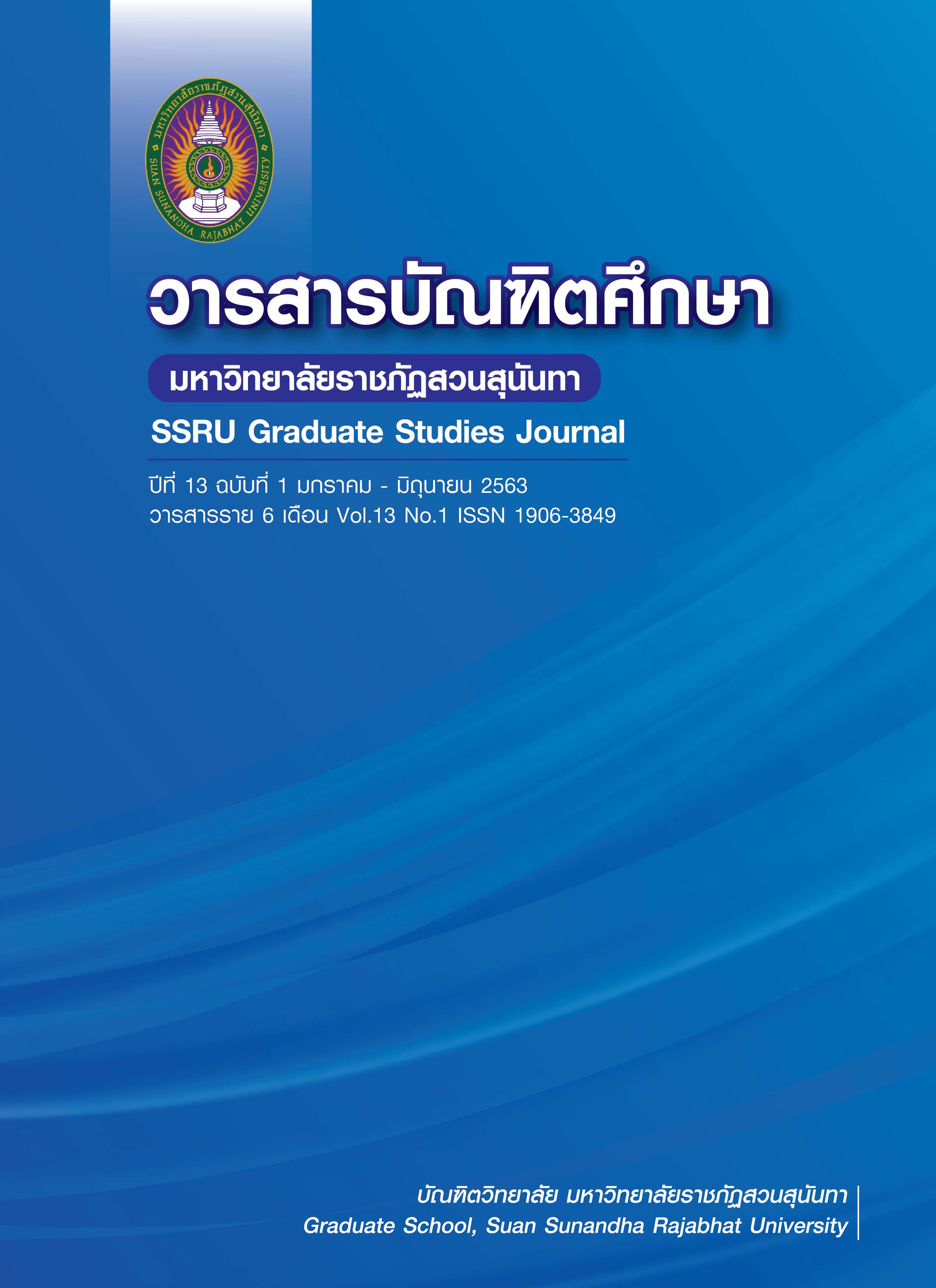การพัฒนาทรัพยากรมนุษย์ในธุรกิจโรงแรม กรณีศึกษา การพัฒนาตนเองด้านการศึกษาของพนักงานธุรกิจโรงแรมด้วยช่องทางการศึกษาออนไลน์
Main Article Content
บทคัดย่อ
วัตถุประสงค์การวิจัย คือ 1) เพื่อศึกษาความต้องการพัฒนาตนเองด้านการศึกษาของพนักงานธุรกิจโรงแรมด้วยช่องทางการศึกษาออนไลน์ และ 2) เพื่อศึกษารูปแบบการพัฒนาตนเองด้านการศึกษาของพนักงานธุรกิจโรงแรมด้วยช่องทางการศึกษาออนไลน์ งานวิจัยครั้งนี้เป็นงานวิจัยแบบเชิงปริมาณ (Quantitative Research) เก็บรวบรวมข้อมูลด้วยแบบสอบถามออนไลน์ (Google Form) จากพนักงานโรงแรมที่อยู่ในโรงแรมมาตรฐานการบริการระดับ 4 ดาวขึ้นไป ที่มีวุฒิการศึกษาอยู่ในระดับไม่สูงกว่าระดับปริญญาตรีที่ปฏิบัติงานอยู่ในโรงแรม จำนวน 172 ชุด วิเคราะห์ผลด้วยโปรแกรมสำเร็จรูปทางสถิติโดยสถิติเชิงพรรณนา ได้แก่ ค่าความถี่ (Frequency) ค่าร้อยละ (Percentage)
ผลการวิจัยพบว่า ผู้ตอบแบบสอบถามส่วนใหญ่เป็นเพศหญิง มีอายุ 21-30 ปี มีรายได้ตั้งแต่ 9,000-15,000 บาท อยู่ในระดับการศึกษามัธยมปลาย ปวส. หรือเทียบเท่า ส่วนใหญ่ปฏิบัติงานในแผนก Food and Beverage ผู้ตอบแบบสอบถามส่วนใหญ่มีการรับรู้และมีความต้องการที่จะพัฒนาตนเองผ่านการศึกษาด้วยระบบออนไลน์ โดยส่วนใหญ่เห็นด้วยกับการลงทะเบียนเรียนเป็นรายวิชา วิชาละ 45 ชั่วโมงต่อรายวิชา สามารถเก็บสะสมหน่วยวิชาได้ไม่เกินระยะเวลา 8 ปี มีค่าลงทะเบียนเรียนคิดตามหน่วยกิตๆ ละไม่เกิน 800 บาทหรือชุดวิชาละ 2,500 บาท และต้องการศึกษาผ่านการเรียนผ่าน คลิป Video การสอนหรือการ Live นอกจากนี้ ยังเห็นด้วยกับการที่ผู้เรียนสามารถลงทะเบียนรายวิชาฝึกงาน/สหกิจโดยฝึกงาน ณ สถานประกอบการที่ทำงานในขณะนั้น และมีการจัดศูนย์สอบหลักประจำภูมิภาค เพื่อสอบวัดผลสัมฤทธิ์ทางการเรียน ทั้งนี้ ผู้ตอบแบบสอบถามส่วนใหญ่เสนอว่า ควรมีการพัฒนาหลักสูตรออนไลน์และใช้รูปแบบการเรียนด้วยวิธีการเรียนการสอนผ่านระบบออนไลน์อย่างเดียว และควรมีการลงทะเบียนเรียนแบบเทียบประสบการณ์ในรายวิชาปฏิบัติการได้
Article Details
เอกสารอ้างอิง
จุฑารัตน์ นกแก้ว. (มปป.). MOOCs: การเรียนการสอนทางไกลผ่านสื่อออนไลน์. เข้าถึงเมื่อ กันยายน 25, 2561 จาก
https://library.stou.ac.th/odi/ODIDistance/HTML/imega/PDF/Distance_21.pdf
ดารณี พิมพ์ช่างทอง และอภิรดา สุทธิสานนท์. (2559). การพัฒนาทรัพยากรมนุษย์ด้านการเรียนรู้เพื่อการแข่งขันทางธุรกิจประจำท้องถิ่นสู่สังคมแห่งการเรียนรู้. สุทธิปริทัศน์. 29(90), 14-30.
นิตยา ทวีชีพ พัชรินทร์ กีรติวินิจกุล และวรรณวิภา จัตุชัย. (2554). ความต้องการการพัฒนาศักยภาพของบุคลากรธุรกิจ โรงแรมในมหาวิทยาลัยราชภัฏเขตกรุงเทพมหานคร. SDU Research Journal Humanities and Social Sciences. 7(1), 11-22. สืบค้นเมื่อ กันยายน 30, 2561 จาก https://so03.tci-
thaijo.org/index.php/sduhs/article/view/5159
นิธิไกร พันธประวัติ และเกียรติอนันต์ ล้วนแก้ว. (2560). ทักษะด้านการใช้งานอินเทอร์เน็ตของพนักงานเครือโรงแรมไทยในเขตกรุงเทพมหานคร. วารสารสุทธิปริทัศน์.
31(100), 208-219.
น้ำมนต์ เรืองฤทธิ์. สภาพและความต้องการแหล่งทรัพยากรการเรียนรู้ออนไลน์ในระบบเปิดสำหรับมหาชน “ด้านครุศาสตร์/ศึกษาศาสตร์”. Veridian e-Journal ฉบับภาษา
ไทย สาขามนุษยศาสตร์สังคมศาสตร์แล ศิลปะและฉบับ International Humanities, Social Sciences and arts. 8(2), 124-140. สืบค้นเมื่อ กันยายน 30,
2561 จาก https://he02.tci-thaijo.org/index.php/Veridian-E-Journal/article/view/39994
พนิดา หนูทวี. (2560). ความต้องการในการใช้งาน e-learning ในการเรียนการสอนของนักศึกษาและอาจารย์ระดับมหาวิทยาลัย. วารสารวิชาการมหาวิทยาลัยธนบุรี. 11
(24), 32-42. สืบค้นเมื่อ กันยายน 30, 2561 จาก https://so03.tci-thaijo.org/index.php/trujournal/article/view/72747
วิทยาลัยดุสิตธานี. หลักสูตรออนไลน์ (การโรงแรม 2 วัน). เข้าถึงเมื่อ 10 มีนาคม 2563 จาก www.facebook.com/traingingdtc
สำนักงานการอุดมศึกษา (สกอ.). โครงการมหาวิทยาลัยไซเบอร์. เข้าถึงเมื่อ 25 กันยายน 2561 จาก https://www.thaicyberu.go.th/th/node/8380
แอดมิดชัน พรีเมี่ยม (Admission Premium). คอร์สเรียนออนไลน์ฟรี มีเกียรติบัตร จากมหาวิทยาลัยชั้นนำของไทย. เข้าถึงเมื่อ 16 มิถุนายน 2563 จาก
https://www.admissionpremium.com/innovation/news/4639


